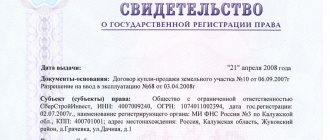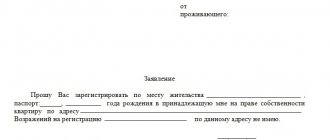When doing good deeds, you need to be prepared for troubles. This expression fits perfectly to the situation when there is a need to register an unauthorized minor on your premises. The negative consequences of registering someone else’s child in your apartment directly depend on the relationship with his parents. If they do not want to be discharged, then in some cases they may lose part of their living space.
What does the law say about children's rights when registering?
Legislation in the Russian Federation protects the interests of the child in his right to housing. Article 54 of the Family Code establishes the child's right to live with his parents. Article 65 of the RF IC gives them the right to independently decide where and with whom the minor will be registered.
According to Article 20 of the Civil Code of the Russian Federation, until the age of 14, a child cannot live with other close relatives or with strangers. This means that parents have the right to register their child at their place of registration, without asking permission from anyone, even the owner of the apartment.
To remove an unauthorized minor from your own home, you must:
- obtain the consent of his legal representatives (parents, guardians);
- indicate a new place of residence;
- Parents must deregister at the same time as their child.
Note! Members of the owner’s family are everyone whom he has registered in his living space, regardless of their degree of relationship.
The procedure for discharging someone else's child requires that his parents have suitable housing in which they can settle the very next day after departure. The most common case of registering other people's children is when one of the spouses has them from a previous marriage. Here, in the event of a divorce, even the court can allow both of them to live in the apartment for a while.
How to register a child in an apartment: detailed instructions
This issue needs to be resolved based on who the child’s home owner . At any age, it is not difficult to register a child with his parents. From the age of 14 , a minor can be registered in the area of his close relatives, if the relationship can be documented.
The registration authority does not have the authority to refuse registration on the grounds that the children are not included in the social tenancy agreement. Also, the registration of minors will not require the consent of the employer and registered family members, which is sometimes necessary for the registration of adult citizens.
We recommend reading: The founder takes a loan from the organization and does not pay it back
What are the consequences of registering someone else’s child if the apartment is for sale?
Transactions with an apartment in which a minor is registered are possible. The law allows this to be done if the child is not an orphan. However, the cost of such housing is falling sharply. The new owner has the right to remove old residents from registration, since they are not members of his family. But who wants to sue if the supply on the real estate market greatly exceeds the demand for it?
Sometimes the ex-spouse, not having the legal opportunity to quickly discharge the ex-partner with someone else’s child, gives living space to relatives. The hope here is that the new owner will easily remove unwanted tenants. However, if the court determines that the transaction was made with the aim of circumventing the law and violating the rights of a minor, it will be declared invalid.
Note! Alienation of an apartment is also possible upon execution of a purchase and sale agreement. In this case, the buyer will lose his home and, most likely, will have to wait a long time for his money back.
Owner's obligations and risks
The owner of the apartment has practically unlimited rights to it. This right also includes providing one’s living space for registration to any person. (Chapter 5, Article 30, Clause 2 of the RF Housing Code).
The family ties of the owner of the apartment and the person wishing to register in it do not matter at all. Only one aspect is important - the consent of the owner.
The apartment can be divided between several owners, in which case the consent of each of them will be required. The accomplished fact of registration at the place of residence gives the registered person the full right to reside in this territory on an equal basis with the owners, and in such a situation it is very important to think about the consequences.
We discussed the question of whether it is possible to register in an apartment without the consent of the owner in this material, and you can find out whether the consent of other residents is really required for registration here.
When the owner of the property allows other people into the property for a period of more than three months, he must provide temporary registration for them. If citizens are not registered on its territory, then the owner of the apartment faces the following:
- If it is discovered that people living on its territory do not have temporary registration, then the owner faces a fine of up to 150,000 rubles, and also faces imprisonment for up to three years or correctional labor with restrictions on the ability to occupy certain positions.
- If the owner from whom the living space is rented does not want to register the tenants, they have the right to file a lawsuit to oblige the apartment owner to issue a temporary registration. However, if there is an agreement to rent an apartment, then it is possible to issue a temporary registration on its basis without the consent of the owner.
- The owner does not risk anything and does not bear any responsibility if the people living in his apartment are close relatives or have permanent residence in the same city.
We suggest you read: Salaries are withheld upon dismissal
Consequences of registering someone else's child in the event of the death of the apartment owner
We will not consider the situation with the will - it is understandable. The apartment will go to the person indicated as the heir. The latter will have to discharge third-party people through the court after he takes over his rights. This means that for at least a year (six months for inheritance plus six months for litigation), someone else’s child and parent will use the apartment as they want.
The option without a will is even worse. According to Russian laws, a person who lives with the owner for a year is recognized as a member of his family and has the right to inherit a share of the property. Thus, someone else’s child may deprive the legal heirs of part of the apartment.

Resolution of controversial situations
Almost all controversial situations that arise when resolving housing issues are resolved in court. The owner has full right to dispose of the apartment and has the right to register and discharge residents from it at his own discretion at any time. Forced discharge of temporary residents before the end of their term is also carried out through the court.
When determining what the owner faces with temporary registration, the practice of litigation on housing legislation does not provide critical examples indicating that the owner of a property has lost his rights in whole or in part due to the registration of temporary residents in his property.
The main appeals to the court on issues of temporary registration:
- refusal of voluntary eviction;
- antisocial behavior of temporary residents or refusal to pay rent;
- registration of temporary registration without the consent of the owner or failure to indicate the final date of registration.
The reasons listed last in this list are possible when filing an application by mail or electronically. In all other cases, the presence of the owner is mandatory and he has the right to control the completion of a satisfactory temporary registration period specified in the application for a certificate of registration at the place of residence.
If you still have questions about the dangers of temporary registration for the owner, then ask them in the comments
Consequences of registering someone else’s child in a non-privatized apartment
Registration of someone else's child in a non-privatized apartment automatically gives him rights to this housing. If the privatization procedure is carried out, he can claim his own square meters on an equal basis with the main tenant. It is impossible to discharge even an adult from municipal housing without his consent if he actually lives in the area.
A responsible tenant should understand that registering someone else’s child will give his parents the right to register in the apartment all existing children or those who will be born during their stay. If residents voluntarily refuse to participate in privatization, they acquire the opportunity to live in the apartment for life. It will be almost impossible to sell a home with such an encumbrance.
Risks and consequences
A resident with a temporary registration acquires the same rights as any other person with a permanent registration, that is, he can:
- Live on the premises of the apartment;
- Register in the territory in which it is registered one’s own children who have not yet reached the age of majority, without the consent of the apartment owner or interested parties.
It is difficult to say whether there are risks for the owner regarding the fact that minor children may be registered in his home without his consent. However, according to the law:
- A child may be temporarily registered in the same territory as his parent for a longer period than the temporary resident himself. Because of this, after the parent’s temporary registration expires, he has every right to file a lawsuit in order to once again obtain registration at the registration address of his son or daughter. In this case, the consent of the homeowner is not required.
- The owner of the apartment can appeal the child’s registration through the court, which will be canceled if there is sufficient evidence.
To avoid such consequences, you should ask the person who will be registered in the apartment in advance whether he has small children. If a child is born to a temporarily registered person, guardianship or adoption occurs, then it is advisable for the owner to be personally present during the registration of the child and independently control the end dates of registration.
If you register a person in an apartment, what consequences might there be? What are the risks when registering a stranger? The owner bears certain risks when he registers a stranger in the residential premises. Among the risks and negative consequences are:
- the impossibility of discharging a stranger without a trial if he is against it;
- the emergence of the right to use living space and live in it;
- the ability for a stranger to register a child in the apartment, since no one’s consent is required.
As a result, by registering a stranger, you can end up with an unwanted tenant and litigation.
The registration of someone else does not give him the right to claim property, since it does not give anyone the right of owner.
In addition, if there are many people registered in the living space, they are not relatives of the owner and do not actually live there, criminal liability for providing fictitious registration is possible.
You can learn about the difference in the concepts of “registration” and “registration”, as well as how temporary registration differs from permanent registration on our website.
The rights acquired by a temporarily registered citizen are similar to the rights of residents with permanent residence registration:
- a temporary tenant acquires the right to stay and live in the apartment;
- This registration form allows you to register your minor children at your temporary address without obtaining the consent of the owner and other interested parties.
It is difficult to say unambiguously whether the temporary registration of a child has negative consequences for the owner of the premises. The consequences of temporary registration for the owner in this case are determined by the articles of the Housing Code of the Russian Federation, which exempt the parent from obtaining the consent of the owners and tenants of housing for the registration of a minor child:
- there is the possibility of a situation in which a citizen has the right to register a minor child with him for a period exceeding the period of his registration - this circumstance arises due to the inattention of FMS employees and the absence of regulations clearly regulating the period of registration of the child. For how long you can make a temporary registration, we tell you here. The result will be the presence of the following problem: the parent, after the expiration of his registration, has the right to be forced through the court to register again at the address of his child;
- temporary registration of a minor child, the consequences of which may be similar to the situation described above, will be appealed through the court and, if sufficient evidence is provided, canceled by a court decision, i.e. In special cases, a child can be discharged without the consent of the mother.
To avoid this situation, when moving in, it is necessary to obtain information about the presence of children of the registered citizen. At birth, adoption, or registration of guardianship of a minor child, it is advisable that the owner be personally present at the FMS office when submitting the application for registration, sign it personally and control the dates that end the period of temporary registration for the parents and the child.
Results
- The consequences of registering someone else's child in your apartment entail not only an increase in utility bills, but also difficulties in selling it.
- You can register a minor without asking permission from the owner of the apartment if one of his parents is registered there.
- Registration of other people's children in municipal housing gives them the right to participate in privatization on an equal basis.
- Other people's children who have lived with the owner for at least a year can claim an inheritance. You can protect yourself from such developments by making a will.
- Temporary registration will help you avoid negative developments when registering other people's children with you.
Where do you register?
To register, you must visit the passport office or the nearest branch of the Federal Migration Service. The presence of the person wishing to obtain registration and the owner of the residential premises is required (in what cases and how it is possible to register a person without his presence, read here).
If there are several owners, everyone must appear. Each participant in this procedure must fill out an application in Form No. 6. A person in need of registration writes a statement about his desire to leave his previous place and register for registration at a new address.
The owners state that they have no complaints regarding the registration of the new tenant.
Important! If there is more than one owner of the property, but all individuals cannot appear at the Federal Migration Service, then a power of attorney is drawn up in advance for one of the owners, which must be officially certified by a notary office.
Required application items:
- The first thing you need to indicate is the name of the body to which the application is addressed.
- Information about the apartment in which the citizen is registered.
- Personal signatures of both parties to the contract (the one who registers and the owner of the property).
We invite you to read: How to obtain guardianship over an elderly person in the Republic of Belarus
What benefits do parents and child receive after registration?
Registering a child at a specific address is an important step that has certain legal consequences. The main purpose of registering a child is to give him the opportunity to enjoy the rights established by law.

The most important points include the following:
- placing the child in kindergarten or school;
- visiting a clinic to receive free medical care;
- receiving additional services.
In fact, it will not be possible to do without registration at the place of residence, but here it is important to correctly explain to the owner that registering a child will not have any legal consequences.
Some details on the topic can be found in the video:
Risks of temporary registration for the owner
Despite the fact that the right of ownership is well protected by the laws of Russia, there are certain dangers for the owner of a living space when registering on a non-permanent basis:
- if the apartment does not have appropriate metering devices, then utility bills will increase several times;
- until the contract expires, purchase and sale transactions will not be possible;
- when preparing documents using mail and online services, there is a risk of completing a transaction without the consent of the owner;
- there is a possibility of residents refusing to voluntarily vacate the occupied premises, as well as their immoral behavior;
- there may also be a risk of residents using the provided premises for other purposes, causing property damage to the owner’s property;
- residents' reluctance to pay utility bills;
- the likelihood of subletting the apartment.
The right to own housing will not pass to another citizen only upon registration, therefore registration at the place of residence will not give him the right to claim a share in the apartment. Despite this, when drawing up a residence agreement under the terms of temporary registration, you need to take into account all the subtleties and nuances of this procedure.
Circumstances under which a child cannot be registered in an apartment
Despite the legislative framework and principles that protect homeowners from the loss of real estate when registering a child, there are a number of circumstances in which such an action should be avoided.

The following situations should be highlighted here:
- You should not register children who are not your own. This usually happens when people get together, but one of the couple has a child. Another one registers this kid for his living space, and then, when people leave, problems arise. This is due to the fact that a minor can only be discharged from their home through a judicial procedure. Moreover, the court, in most cases, remains on the side of the child and retains his right of residence until adulthood. If the owner dies, the registered child will be able to claim part of the inheritance.
- When it comes to registration on the territory of the owner, his grandson. Such circumstances often occur, but in the future, this allows, by analogy with the previous case, not only the child, but also his adult guardian to live in the apartment. It is almost impossible to discharge a child from the apartment, since he is a blood relative of his grandmother or grandfather. Deregistration is allowed only in one case - when a child permanently leaves to live in another city.
- If a transaction is planned to take place in the future involving the property. The fact is that when a baby is registered in the home, the housing will need to be sold only with the permission of the guardianship. Even if the transaction was made, the judicial authority has the right to cancel it, due to the fact that it infringes on the rights of the minor.
- You should not register a child when the apartment is owned by the municipality. Registration of a minor citizen in such a home gives him the right to privatization in the future, and the child is obliged to participate in the procedure upon reaching adulthood. If the baby is registered on the territory of the housing, then in the future he will become the owner of the apartment. It will be impossible to write him out.
All these cases should be taken into account when receiving a request from parents to register a child in an apartment. If you adhere to the general rules and recommendations, then actions to register a child will not have any consequences.







